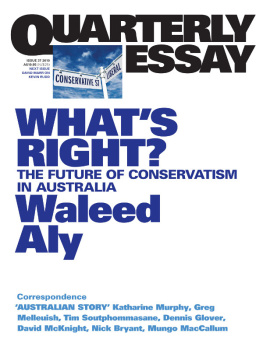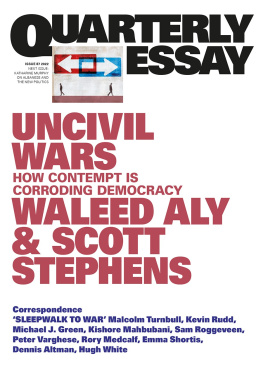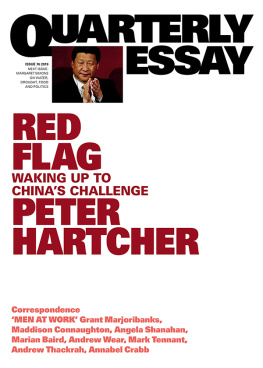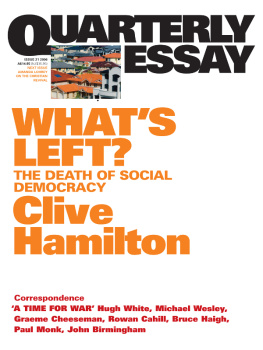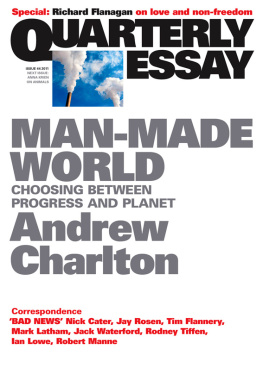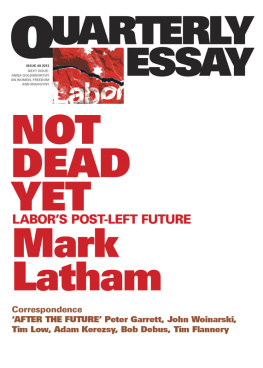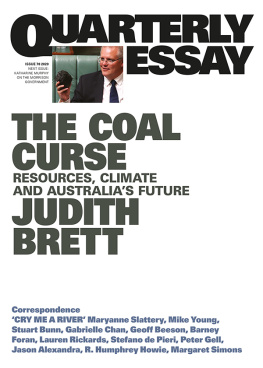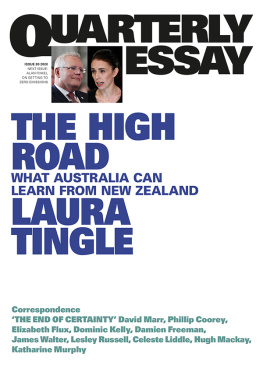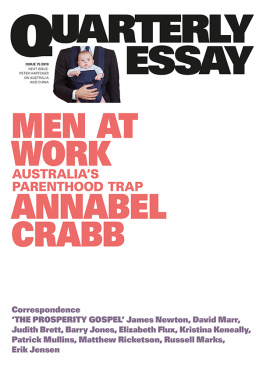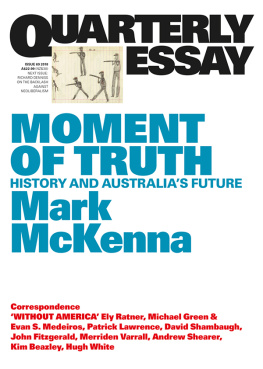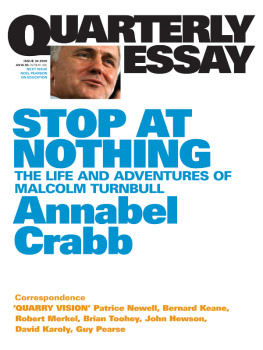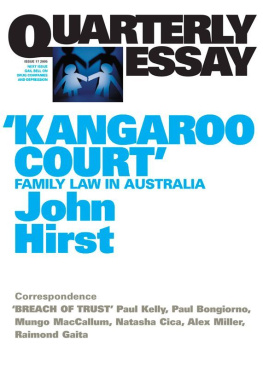Quarterly Essay is published four times a year by Black Inc., an imprint of Schwartz Media Pty Ltd.
Publisher: Morry Schwartz.
ISBN 978-1-86395-466-2 ISSN 1832-0953
ALL RIGHTS RESERVED.
No part of this publication may be reproduced, stored in a retrieval system, or transmitted in any form by any means electronic, mechanical, photocopying, recording or otherwise without the prior consent of the publishers.
Essay & correspondence retained by the authors.
Subscriptions 1 year (4 issues): $49 within Australia incl. GST. Outside Australia $79.
2 years (8 issues): $95 within Australia incl. GST.
Outside Australia $155.
Payment may be made by Mastercard or Visa, or by cheque made out to Schwartz Media. Payment includes postage and handling.
To subscribe, fill out and post the subscription card, or subscribe online at:
www.quarterlyessay.com
Correspondence and subscriptions should be addressed to the Editor at:
Black Inc. Level 5, 289 Flinders Lane
Melbourne VIC 3000 Australia
Phone: 61 3 9654 2000 / Fax: 61 3 9654 2290
Email:
quarterlyessay@blackincbooks.com (editorial)
subscribe@blackincbooks.com (subscriptions)
Editor: Chris Feik. Management: Sophy Williams, Caitlin Yates. Publicity: Elisabeth Young. Design: Guy Mirabella. Production Co-ordinator: Adam Shaw
Printed by Griffin Press, Australia.
The paper used to produce this book comes from wood grown in sustainable forests.
WHATS
RIGHT?
The Future of Conservatism
in Australia
Waleed Aly
Andrew Kennys brilliant essay in the 5 February 2005 issue of the Spectator should be made compulsory reading for anyone interested in contemporary political discourse. It is a swift, clinical, devastating demolition of the twin terms that are so relentlessly and unthinkingly used to frame our discussions of politics. Those terms, of course, are Left and Right, and in spite of their ubiquity they are utterly meaningless and should be abandoned by anyone interested in having a substantial political conversation. Here is Kennys first paragraph:
Is Osama bin Laden left-wing or right-wing? How about Robert Mugabe? Who has a more left-wing approach to womens sexuality: Pope John Paul or Hustler magazine? Consider Fidel Castro. He persecutes homosexuals, crushes trade unions, forbids democratic elections, executes opponents and criminals, is a billionaire in a country of very poor people and has decreed that a member of his family shall succeed him in power. Is Castro left-wing or right-wing? Explain your answer.
The terms Left and Right derive from the French Revolution. In 1791, when the French Legislative Assembly sat, those loyal to the king sat on the right of the chamber. Those who supported the revolution sat on the left. It is a seating pattern that continues to this day in our own parliament. The party in government, being the established power, sits on the right wing; the opposition on the left. But it is lamentable that this historical quirk has so captured our lexicon. Even in revolutionary France it told us nothing about questions of substantive policy. At different times, the Left included socialists and supporters of laissez-faire economics. There are many things that are worth importing from France: cheese and fashion, for example. Political nomenclature is not among them.
Kenny raises, then eviscerates, every possible definition one might use to try to give meaning to these terms. Do we say Attila the Hun was right-wing because he was violent and cruel? Lenin outdid him in both respects. Is Lenin to the right of Attila? Is it left-wing to believe in individual freedom like the right to carry guns? Is it right-wing to believe in economic freedom like the right to unrestricted freedom of movement across national boundaries to find work? Does the Left believe in centrally planned economies, such as in Nazi Germany and apartheid South Africa? Does the Right believe in free trade, as did Adam Smith and Karl Marx? Is it left-wing to hate capitalism, like Hitler? Is the Left internationalist, like McDonalds and the World Trade Organization? Is the Right racist, like the early communist party of apartheid South Africa, whose motto was Workers of the World Unite, and Fight for a White South Africa!?
The point is that these terms do not facilitate thought. They merely replaced rational argument with a playground division into two gangs who understood nothing clearly except how much they hated each other. That is the crux of the matter. Wherever you encounter Left and Right, you are likely to be encountering political vitriol. You are almost certainly not encountering a discussion of anything substantive.
Our political discourse is drenched in Left and Right because it is so deeply impoverished. Left and Right are the hallmark of a political conversation that is obsessed with teams and uninterested in ideas. That is the way things tend to proceed in this country: we report politics as though it is sport, and sport as though it is politics. The sports pages are full of ideas about team development, about long-term recruitment strategies, about philosophies of coaching and the psychology of players. The news pages obsess over winners and losers, over political strategy (but not political thought), and, of course, our commentary is full of Left and Right, good and evil, us and them. Yes, there is good and evil in politics and much in between, but at the heart of it all, even if unconsciously, are ideas. Ideas are the engine of political history. In the long run they matter more than short-term winners and losers. It is in many ways irrelevant which party wins the next election except perhaps for those barracking for a particular team. It matters far more what ideas they use to govern.
In February 2009, Kevin Rudd offered his analysis of the causes of the global financial crisis in an essay for the Monthly. At the core of it was an (emphatically negative) assessment of neo-liberalism one of the most important ideas of the last thirty years of Western politics. No doubt it was a calculated political tactic, designed to establish in the publics mind that the global recession was to be associated with the Liberal Party. Nevertheless, it was a shock to our political discourse: a prime minister analysing at length what neo-liberal ideas meant in practice, and how they had triggered the near-collapse of the global economy. This is not what politicians have tended to do in recent times. Ours is the age of the soundbite, an age hostile to the public discussion of ideas, especially from those seeking election. It elicited entirely predictable responses. Those on team Right derided it as a shabby piece of work, full of perversions of history and grand, vacuous theorising, while those on team Left hailed it as an incisive, honest and much-needed account of our present predicament.
The Rights criticisms seemed, broadly speaking, to comprise the following: 1) Rudd had contradicted himself by claiming to be a fiscal conservative and then rejecting neo-liberalism; 2) Rudd had misdiagnosed the causes of the financial crisis; and 3) Rudd was being inconsistent because the neo-liberal policies of the Howard government were in fact only continuing the economic reforms of the Hawke and Keating governments, which he continued to praise. The last point is undoubtedly correct, the second point is highly debatable, and the first point strikes me as ridiculous. But what none of these responses did was to engage with the idea in question. The critics of the Right were concerned to defend neo-liberalism, apparently accepting that they were irrevocably associated with it. That much was clear. Far less clear was what they thought neo-liberalism actually meant. If the only way to be a fiscal conservative is to be a neo-liberal, then this involves a very odd definition of at least one of those terms. Neo-liberalism is about much more than balancing budgets (though it does support this), and, as it happens, many of the Western political leaders to have been most influenced by neo-liberal thought also left office with extremely large deficits.

